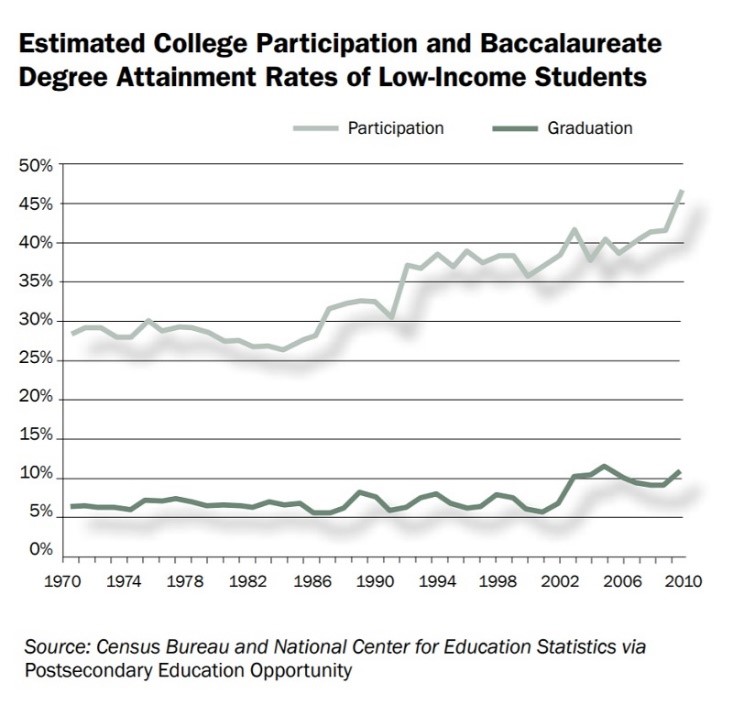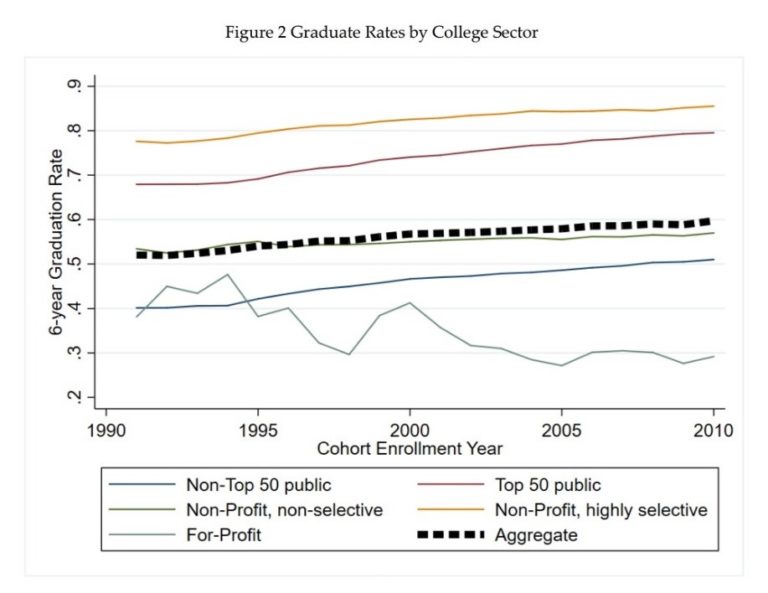In the 1990s, only 40 percent of students who entered a four-year state college graduated within the next six years. In the 2000s, that six-year graduation rate increased—to 50 percent. But during that timeframe more poorly prepared students also entered college, so one would expect a drop in graduation rates, not the opposite.
So why did the opposite happen? A new study from Brown University, reported recently in The Atlantic, examines that question and concludes the most likely reason is that colleges have lowered their standards even further.
While student achievement over this timeframe decreased, as measured by math test scores, their college grade point averages and graduation rates increased. In other words, it appears colleges are further inflating these measures, a trend that has been documented since federal taxpayer funding of so-called higher education exploded.
“Our findings combined with trends in studying and labor force participation in college suggest standards for degree receipt have changed,” the researchers conclude. They controlled for students’ background characteristics like family income and race, the majors they choose, and the kind of colleges they attended, and found all of these “explain little of the change in graduation rates.”
“Put another way, equally prepared students with the same family income, parental education, gender, and institution type have higher GPAs” in 2004 than they did in 1998 and are more likely to graduate, write study authors Jeffrey Denning, Eric Eide, and Merrill Warnick. Other studies have found that a similar dynamic has been at work in U.S. high schools for at least a century.
Graduate the Kids Or Else
It is probably no coincidence that this trend happened as state and federal governments started measuring colleges by graduation rates because more enrollees drop out of public institutions than graduate. One factor that supports this conclusion is that the study documented bigger increases in graduation rates and GPAs among public institutions despite their lower-performing student bodies compared to private institutions.
While between 2000 and 2015 federal taxpayers spent $300 billion on Pell Grants, the most spendthrift federal college program, a 2014 federal review found that 61 percent of recipients did not earn a bachelor’s degree within six years of starting college. Once a program for lower-income students, Pell Grants now fund the majority of college students, and many are from middle-income families. The program spent $26.9 billion in 2016-17, the most recent academic year for which data is available.
Pell recipients’ graduation rates are markedly lower than those of non-recipients, a 2015 Hechinger Report analysis found. That’s not surprising, because students do not have to earn Pell subsidies through academic achievement.
The sparse data available shows the typical Pell recipient has a lower SAT score than the average test-taker (914 versus 1010). In other words, the typical Pell recipient is the higher education equivalent of a subprime mortgage. And now Democratic presidential candidates want taxpayers to bail out yet another system politicians have inflated to dangerous levels, by expanding this setup through various incarnations of “college for all.”

Lots of Accountability Talk, Zero Action for Decades
The federal government has a history of not publishing graduation rates and other important data for Pell Grants, notwithstanding neverending bluffing from U.S. education secretaries from both major parties about “accountability.” Lawmakers have not yet applied the most effective consequence to low-performing students and institutions: yanking taxpayer funds. Government “accountability” measures usually involve more bureaucrats filing more reports, thus siphoning even more resources away from students.
This has helped college waste four to six more years of many American young people’s lives, rather than channeling their energy into productive, entry-level jobs, which can more quickly and effectively develop their skills.
The wastefulness of most so-called higher education has also been documented for decades. “Full-time” college students report that on average they spend less than 20 hours per week on academics. They spend almost three times as much of their days on shopping, eating, socializing, and other leisure activities as on academics. College students today spend less than half the time on academics than students did several decades ago.
This is partially because college has gotten easier. Economist Bryan Caplan notes in another Atlantic article the poor mental abilities the average college graduate demonstrated 16 years ago:
In 2003, the United States Department of Education gave about 18,000 Americans the National Assessment of Adult Literacy. The ignorance it revealed is mind-numbing. Fewer than a third of college graduates received a composite score of ‘proficient’—and about a fifth were at the ‘basic’ or ‘below basic’ level. You could blame the difficulty of the questions—until you read them. Plenty of college graduates couldn’t make sense of a table explaining how an employee’s annual health-insurance costs varied with income and family size, or summarize the work-experience requirements in a job ad, or even use a newspaper schedule to find when a television program ended. [emphasis added]
In 2011, Richard Arum, Josipa Roksa, and Esther Cho found that 45 percent of college students make no measurable learning advances in their first two years of college. Thirty-six percent made no improvement in all four years of college. “In an extensive review of the literature presented in How College Affects Students,” they noted, “Ernest Pascarella and Patrick Terenzini estimated that students in the 1980s learned at twice the current rate.”
Things have only gotten worse since these studies and their underlying data were compiled and analyzed, one reason such information is only rarely compiled. In the Common Core era, which began in 2010, K-12 student achievement has been at best stagnant, and in several cases apparently declining. Thus while students are getting less-prepared for college, more are getting higher grades and graduating.
Are Colleges Juking Stats Under Government Pressure?
Outside of top-tier institutions, both public and private, six-year graduation rates remain shockingly low, even with the recent increase. Plenty of research shows that graduating is what confers the vast majority of the wage jump for those who attend college.
That plays into a phenomenon called “signaling,” an economic term that means the typical college degree says less about whether someone actually learned anything in college than the kind of person he or she probably was regardless of attending—reasonably punctual, able to endure boredom, possessing a better work ethic than those who don’t graduate college.

“As a society, we continue to push ever larger numbers of students into ever higher levels of education. The main effect is not better jobs or greater skill levels, but a credentialist arms race,” Caplan says, based on the relevant economic research.
In other words, we are forcing students to spend tens of thousands of dollars and four to six years of their prime checking meaningless boxes just to make hiring easier for employers and to preserve the jobs of the people babysitting them in the meantime. Oh, and to confer on everyone involved a probably outsized view of their intellectual achievements and social worth.
Are the Economic Benefits of a Degree Declining?
But as gradually greater percentages of high school graduates attend college—67 percent of the high school class of 2017 enrolled in college that fall—this signaling feature of a college degree seems to have declined. So also may be the higher salary college graduates earn on average compared to those who didn’t graduate college.
Several recent studies have found that the lifetime economic benefits of a college degree have flatlined or are even declining. A 2019 study found that for Americans born after 1977 the college wage premium has declined on longitudinal measures (although it only flatlined on non-longitudinal surveys, instead of declining).
“A primary implication of our findings is that the demand for skill is flattening and may even be falling… This interpretation is consistent with recent literature cited above that has documented declining income and employment prospects for younger birth cohorts,” write study authors Jared Ashworth and Tyler Ransom. This suggests that as the pressure to attend college has increased, the actual value that students derive from doing so has flattened or declined.
The economic value of a generic college degree has long been in question. College pushers like to note that people who get degrees earn higher lifetime incomes. But that doesn’t prove those higher lifetime incomes represent real value rather than the result of social stigmas and economic discrimination, such as in requiring applicants to have a degree for jobs that don’t actually need one, which is endemic. Caplan’s 2018 book amasses loads of economic research to make this case.
As economist Richard Vedder noted in 2012, after “[c]ontrolling for other factors important in growth determination, the relationship between education spending and economic growth is negative or, at best, non-existent.” In other words, there’s plenty of good evidence to suggest that, for many or even most of today’s enrollees, college is a taxpayer-backed scam.
A Subprime College Bubble
Just like easy federal money and identity politics-driven mandates pushing home buying that led to the 2008 subprime mortgage crisis, easy money for college has especially lured poor and poorly prepared students into colleges from which they won’t graduate but will accumulate crippling debt.
“[I]t appears that the Pell Grant Program has led more low-income high school graduates to enter college,” write Jenna Robinson and Duke Cheston in a 2012 Pope Center paper.
The National Bureau of Economic Research (NBER), a private research organization, recently reviewed and published a study on the available literature on financial aid. It concluded that lowering the annual price of higher education by $1,000 (either through tuition reductions or non-repayable aid) leads to a 3 to 5 percentage point increase in postsecondary attendance.20 In other words, the effect of $100,000 spent on one hundred students would be that three to five students who would not have chosen to go to college would change their minds because of the availability of increased aid.
It’s an injustice. This easy money system exploits the poor and disadvantaged to make better-off people comfortable. Those who profit from this mess include businesses that don’t have to train employees, college staff whose jobs remain secure, spenders and lenders taxpayers are pressured to bail out, and voters who refuse to demand an end to a taxpayer-funded system that fails at least half the people who enroll in it, so long as their kids can get other people to pay for their degree.
But unchecked corruption only grows. This endemic corruption of U.S. education is now affecting everyone involved, rich and poor alike, a probable majority of whom are being cheated out of a real education and a real start in life. Inflated GPA numbers can only hide that reality for so long before America’s education bubble finally pops.